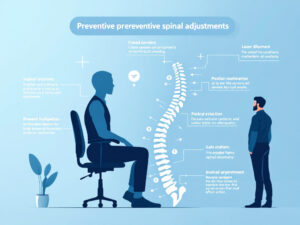Understanding postpartum back pain
When you’re recovering from childbirth, experiencing tension or aching in your lower back may feel overwhelming. Finding a postpartum back pain relief chiropractor can provide the gentle, targeted support you need. Whether you had a vaginal delivery or a C-section, your body has undergone significant changes, from hormonal shifts to pelvic misalignment. These shifts can lead to discomfort that lasts for months if left unaddressed.
Up to 75% of postnatal women experience back pain following childbirth [1], and about 20% continue to have pain three to six months later [2]. Understanding why you feel this way is the first step toward lasting relief.
Causes of postpartum back pain
- Pelvic misalignment and spinal subluxations after delivery
- Ligament laxity from hormone relaxin, which softens connective tissue
- Weakened core muscles and diastasis recti putting strain on your back
- Postural changes while breastfeeding, lifting, and carrying your baby
- Scar tissue and muscle tension from C-section recovery
Symptoms to watch
Look for these common signs that your body needs attention:
- Dull or sharp pain in the lower back or tailbone
- Sciatica, where pain radiates down your leg
- Neck and shoulder tension from prolonged nursing positions
- Limited range of motion when turning or bending
- Discomfort during daily tasks like lifting your newborn
When to seek help
If you notice any of the following, it’s time to consult a specialist:
- Pain that disrupts your sleep or daily routines
- Pain lasting more than a few weeks without improvement
- Radiating pain, numbness, or tingling in your legs
- Difficulty walking, standing, or sitting for normal periods
- Worsening discomfort despite rest and gentle home remedies
Exploring chiropractic relief
Chiropractic care can address the root causes of your postpartum back pain by gently realigning your spine and pelvis. By focusing on holistic methods, a qualified practitioner helps you regain balance, reduce nerve pressure, and support natural healing. This personalized approach not only eases discomfort but also promotes long-term wellness.
How gentle adjustments help
During a gentle chiropractic adjustment, precise pressure is applied to misaligned joints to:
- Restore proper spine and pelvic alignment
- Ease nerve irritation and relieve sciatica
- Improve blood flow and circulation to affected areas
- Reduce muscle tension and promote relaxation
- Enhance your body’s natural healing response
Techniques for postpartum care
A specialized postpartum chiropractor may use:
- Webster-certified techniques to balance your pelvis and support breastfeeding
- Gentle spinal adjustments tailored for recovering maternal bodies
- Myofascial release to break up scar tissue and knots
- Soft tissue therapies for muscle recovery and tension relief
- Rehabilitation exercises to strengthen your core and pelvic floor
Learn more at our prenatal and postpartum chiropractic clinic Charlotte.
Holistic soft tissue therapies
Complementary therapies often accompany adjustments:
- Myofascial release to improve tissue mobility
- Trigger point therapy for persistent muscle knots
- Light massage to enhance circulation and reduce stress
- At-home self-massage and stretching routines
Preparing for your sessions
Knowing what to expect can help you feel confident and comfortable at your visits. Your practitioner will design a care plan based on your medical history, delivery type, and current symptoms to ensure safe, effective treatment.
What to expect on first visit
During your initial consultation, your chiropractor will:
- Review your health history, including pregnancy and delivery details
- Perform a thorough postural and spinal assessment
- Identify areas of misalignment using gentle palpation
- Explain recommended techniques and answer your questions
- Initiate your first gentle adjustment or soft tissue therapy
Safety considerations postpartum
Most women begin chiropractic care about six weeks after delivery to allow initial healing, especially after a C-section [3]. If you had a complicated surgical recovery, your chiropractor will work with your healthcare provider to choose the right timeline. Always inform your practitioner of any medical concerns or procedures.
Timing and frequency
Your care plan may include:
- 1–2 visits per week during the first month
- Gradual tapering to weekly or biweekly sessions
- Transition to monthly wellness visits after alignment stabilizes
Consistent care helps prevent recurrence of misalignments and supports faster recovery.
Selecting your trusted chiropractor
Choosing the right postpartum back pain relief chiropractor is essential for safe, effective care. Look for providers who specialize in women’s wellness and understand the unique needs of postpartum bodies.
Qualities to look for
- Specialization in prenatal and postpartum care
- Certification in Webster technique and gentle adjustments
- Experience with C-section recoveries and diastasis recti
- Empathetic, patient-centered approach
- Clear communication and education for self-care
Local Charlotte specialists
You have access to skilled professionals in the Charlotte area, such as:
- Postpartum chiropractor Charlotte NC
- Female chiropractor Charlotte NC
- Webster certified chiropractor Charlotte NC
Reach out to schedule a consultation and find a practitioner who feels like the right fit for your journey.
Evaluating certifications and experience
When evaluating chiropractors:
- Confirm formal training in women’s health and pregnancy care
- Ask about continuing education in gentle chiropractic adjustments for women
- Verify membership in professional associations focused on prenatal and postpartum wellness
Maintaining alignment at home
Your recovery continues beyond the clinic. By incorporating simple exercises, posture tips, and regular check-ins, you can sustain your progress and minimize future back pain.
Recommended exercises
Perform these gentle moves daily or as directed:
- Pelvic tilts to engage your core and stabilize your spine
- Bridges to strengthen glutes and lower back
- Cat-cow stretches for spinal mobility
- Knee-to-chest stretch to relieve lower back tension
- Bird-dog exercise for core and balance support
For additional guidance, explore gentle chiropractic adjustments for women.
Postural and ergonomic tips
- Maintain a neutral spine while breastfeeding, using pillows for support
- Use a hands-free breast pump or wear a support belt when pumping
- Practice proper lifting mechanics when picking up your baby
- Adjust car seat height and stroller ergonomics to reduce bending
- Keep feet elevated when sitting to lessen lumbar strain
Scheduling follow-up care
Regular visits help you stay on track:
- Plan a monthly wellness check to catch minor misalignments early
- Communicate any new symptoms or activity changes promptly
- Consider our women’s gentle chiropractic wellness program Charlotte for ongoing support
By staying proactive, you maximize the benefits of chiropractic care and enjoy lasting relief.
You don’t have to accept persistent discomfort as part of motherhood. A trusted postpartum back pain relief chiropractor can offer safe, holistic solutions to realign your spine, ease nerve pressure, and empower you with self-care techniques. Take the next step by reaching out to a specialist in Charlotte who understands your journey and is committed to helping you thrive.




